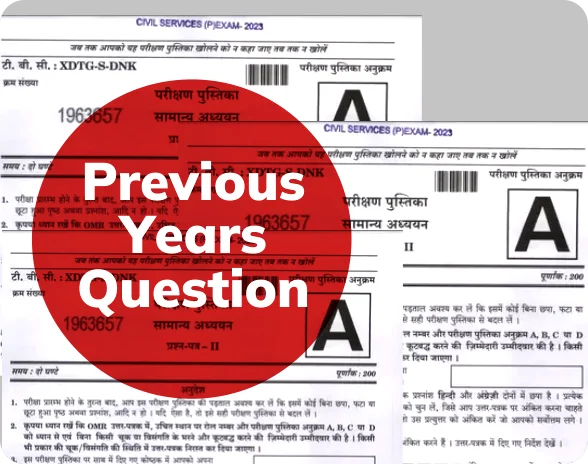Download UPSC Prelims & Mains Question Papers!
The UPSC civil services examination has multiple stages. These include objective prelims, subjective mains, and a personality test. Competition gets tougher each year. Using UPSC solved paper from previous years’ exams is now more important in your preparation.
Practising using past IAS exam papers grants you deeper exam insights. You can learn about question types, structured writing, and recurring concepts. You can also learn about evolving exam patterns, scoring distribution, etc. You enhance your understanding of dimensions through question testing. Previous Year Questions (PYQs) help you realise your current knowledge levels. They also help identify preparation gaps for focused strengthening. Improve exam simulations with a question bank of 5000+ UPSC previous year solved question paper!
We provide UPSC mains solved papers PDFs to aid your exam preparation. The PDFs cover papers from the past decade, including prelims and mains. Read on to download these valuable UPSC/IAS question paper resources now.

UPSC Question Papers Download IAS Question Paper PDF For Free
The importance of past UPSC prelims and mains question papers with answers and explanations from expert guidance cannot be overemphasised. We provide question papers and their detailed solutions spanning the past decade from 2013 to 2022. These are free downloads below. Early birds can start their 2023 exam preparations without delay. Solving these past civil services question sets helps you develop an effective exam strategy. They cover general studies and essay stages. This tailors the strategy to your strengths.
Consistently attempt various previous years’ UPSC papers by topic or area. Do this over the next 12 months in a planned manner. This will help you gain deeper insights into evolving exam patterns. It will also help you recognise your strong and weak areas. It will enhance your answer-writing skills. You can evaluate your preparedness over time and improve your speed and accuracy. These are vital for maximising scores and rank improvements.
Last 10 Years UPSC Question Paper
If you are an aspirant for the UPSC Civil Services exam in 2023, start by practicing with previous years’ question papers. It is pivotal for improving your chances of getting selected for coveted administrative roles like IAS/IPS. The importance of past UPSC prelims and mains question papers with answers and explanations from expert guidance notices cannot be emphasised enough.
The UPSC conducts a rigorous three-stage selection process to recruit candidates for the prestigious Civil Services, including IAS, IPS, IFS, etc. The exam tests candidates’ intellectual ability, analytical skills, and aptitude for public service.
The first stage is a preliminary screening exam consisting of two objective-type papers: Paper I tests general studies, and Paper II tests aptitude skills. Candidates must clear a fixed cutoff in both papers to qualify for the main exam.
UPSC Prelims Solved Paper
2024
2023
2022
2021
2020
Prelims GS I
2019
Prelims GS I
The second stage has a written exam with 9 descriptive papers testing subject knowledge across varied areas like essays, general studies, etc. Those who clear the main cutoff get shortlisted for the final interview round.
The third and final stage is a personality test in the form of an extensive interview with the UPSC panel. The final selection depends on combined performance in the main written examination and interview.
Candidates appearing for the upcoming UPSC Prelims and Mains can check and download the UPSC Question Papers (Yearwise) and start solving them as soon as possible. Access a comprehensive list of the last 10 years UPSC mains solved papers PDF. Analyse these UPSC previous papers, identify trends, and enhance your preparation strategy for the civil services examination.
UPSC Mains Solved Paper
2023
Essay
GS-1
GS-2
GS-3
GS-4
2022
2021
General Studies I
General Studies II
General Studies III
General Studies IV
2020
General Studies I
General Studies II
General Studies III
General Studies IV
2019
General Studies I
General Studies II
General Studies III
General Studies IV
Videos
Here are a few videos to help you through your preparation for your UPSC Mains:
Videos
Here are a few videos to help you through your preparation for your UPSC Mains:
Benefits of UPSC CSE Previous Year Question Papers
Here are the key advantages of UPSC previous year question paper solved for your exam prep:
- Solving past papers enhances concept clarity. It aids in deeply understanding the topics critical for the multi-disciplinary UPSC syllabus.
- Exam Readiness helps gauge your actual preparation levels. It boosts confidence and reduces exam shock/anxiety.
- To succeed, develop essential skills like time management, structured writing ability, and problem comprehension.
- Updated Domain Knowledge: UPSC papers incorporate current affairs. Practising them keeps your GK updated.
- Exposure to past multiple-choice essay questions enhances comprehension of topics. These include historical events, governance reforms, and budget provisions. This boosts a superior grasp over test areas. Revising via past papers aids retention.
- Real Exam Simulation: Timed attempt familiarises with actual exam constraints, reducing surprise factors. Helps evolve personalised attempt approach aligned to strength areas.
Frequently Asked Questions
Which is the best book for UPSC solved papers?
The UPSC civil service exam is one of India’s toughest recruitment tests, drawing lakhs of aspirants. Having the right study resources and preparation strategies in place is critical, and previous years’ solved papers provide insights into evolving exam trends. The best-recommended book for the UPSC exam is Disha Publication. This exhaustive volume stands out for its structured, in-depth solutions, guiding the revision of concepts with errorless printing of authentic papers and affordable pricing. This makes it accessible for all UPSC hopefuls across popular options through data-represented trends. It highlights asked topics, and changes focus areas year-on-year with weightage.
How to solve UPSC mains?
Those with a strong foundation in general knowledge and writing skills may attempt focused preparation in 3 months. However, doing so often leads to superficial knowledge. Despite best efforts, such narrow preparation is inefficient. It doesn’t help score high against the UPSC’s benchmarks for depth in answers. Hence, a systematic 6-12 month study plan suits the main exam’s extensive syllabus better for most civil services aspirants. Solving the UPSC English compulsory paper solved PDF and UPSC prelims solved paper can improve your understanding of the concepts and help clear your mains.
Can I clear mains in 3 months UPSC?
It is challenging for a candidate to clear the UPSC civil services mains exam in three months.
The UPSC curriculum is vast. Aspirants are tested on their knowledge across General Studies and optional subjects. Most candidates need 6-12 months of dedicated preparation. This is because the tests cover current affairs, theoretical concepts, and fact-based knowledge.
Covering the entire syllabus for mains in 90 days is unrealistic. Especially for those with work or academic commitments. A focused attempt in 3 months may be possible for those with a strong foundation in GK and writing skills. Rushing preparation in 3 months often leads to superficial knowledge.
What are the 7 papers of UPSC mains?
The UPSC civil services mains exam consists of seven papers that test candidates on diverse subjects.
- Paper A examines proficiency in one Indian language chosen by the candidate. Paper B tests English language skills.
- Paper I is an essay that evaluates writing skills and analytical thinking on contemporary topics.
- Papers II to V are on General Studies covering history, politics, environment, science and other areas.
- Papers VI and VII are on two Optional Subjects chosen by the candidate from a list of approved subjects.
- Finally, the Personality Test/Interview round assesses a candidate’s suitability for senior public service roles.
Guidance from successful seniors on attempted strategies for each paper is beneficial for candidates to maximise their scores. Thorough preparation across this diverse syllabus is critical to succeed in the UPSC civil services exam.
How to solve PYQ for UPSC?
Here are effective strategies to solve Previous Years’ Questions (PYQ) in UPSC preparation:
1. Categorise PYQs paper-wise, subject-wise, and topic-wise. Go 15-20 years back to identify historical trends and evolving patterns.
2. Mark questions with slight variations in framing year after year.
3. Note essential keywords, structures, and contexts highlighted in many past papers.
4. Identify fundamental knowledge gaps where you could not solve specific questions.
5. Refer to detailed, authentic answers. Incorporate relevant insights into your personalised revision notes.
6. Gradually integrate new PYQ trends and UPSC’s evolving focus areas into your regular preparation routine.
7. Practice writing timed mock test answers per UPSC’s latest recommendations on word limits.
8. Get your written answers reviewed by experienced teachers and work hard on implementing the feedback.
9. Identify key weaknesses in retention, conceptual clarity, and structured writing. Keep revising PYQs already solved to enhance their long-term retention.
Solving UPSC’s previous year solved question paper is critical as it helps aspirants clear doubts and work on errors.
Is the previous year question paper enough for UPSC?
No, relying on solving UPSC Previous Years’ Question Papers is inadequate preparation. Solving PYQs does not build memory and concept application skills. These skills are vital for solving current affairs-based questions. A solid base of fundamentals reflected in PYQs provides a helpful starting point. Solving UPSC’s previous year solved question papers also builds exam temperament and speed. However, depending on them can reduce the chances of attempting a sure-shot paper. PYQs provide the question style but not the full, evolving, fresh, real-world content that UPSC focuses on.
Are previous questions repeated in UPSC?
Data collected over the years shows that UPSC repeats direct, indirect, and concept-based questions from its vast past years’ question pool, with roughly 15-20% repetition observed year-on-year. This repetition is particularly visible in core subjects like politics, geography, science, and current affairs. path to understanding the exam. It also serves as an essential memory tool to supplement preparation.
Data collected over the years shows that UPSC repeats direct, indirect, and concept-based questions from its extensive past years question pool. We observe roughly 15-20% repetition year-on-year. This repetition is particularly visible in core subjects. These subjects include politics, geography, science, and current affairs. Solving the previous years’ UPSC prelims solved paper book helps to understand the exam. Mains solved papers UPSC also provides a path to understanding the exam. It also serves as an essential memory tool to supplement preparation.



